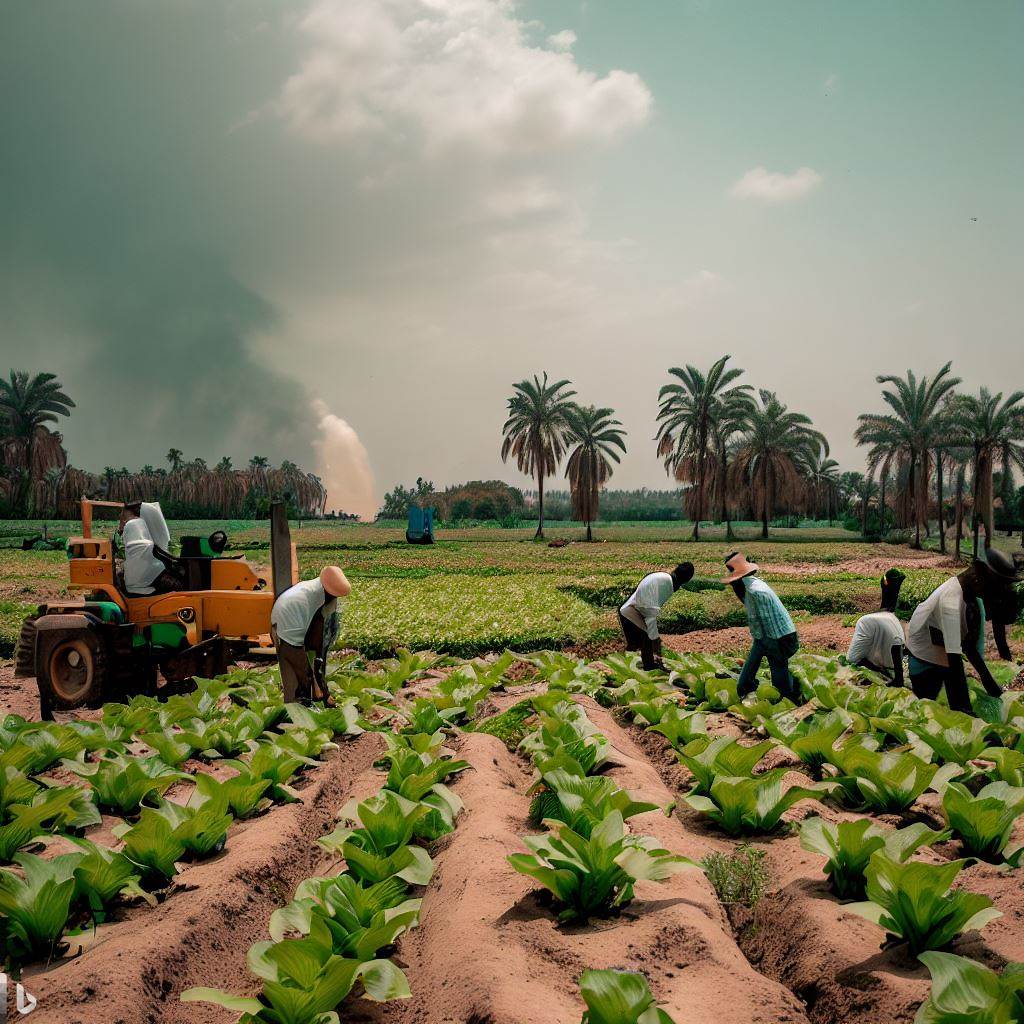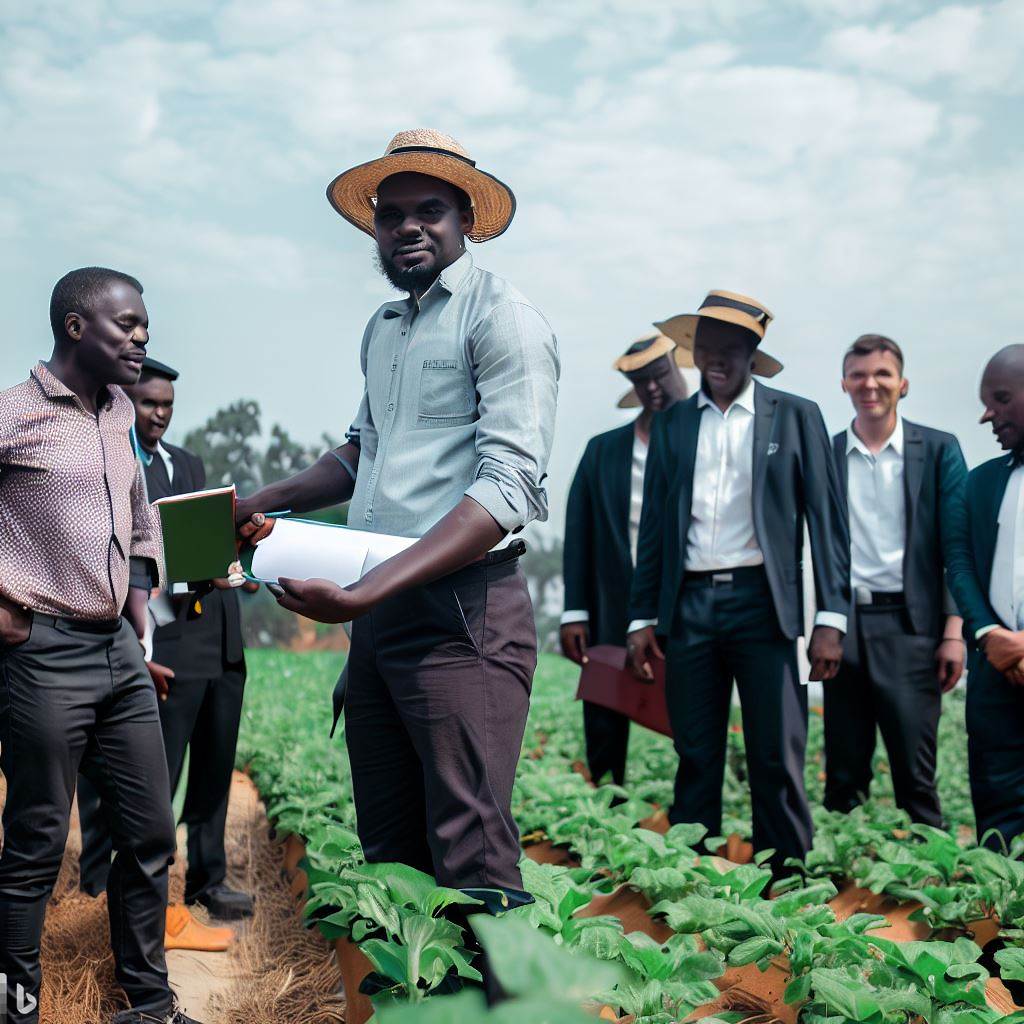Introduction
In this blog post, we delve into Agricultural Operations Management and Nigeria’s Response to Climate Change. Agricultural operations management is the process of planning, organizing, and controlling various activities in farming.
It involves the efficient utilization of resources, such as land, labor, and capital, to maximize agricultural productivity.
Addressing climate change in agricultural practices is crucial due to its impact on food production and security.
Climate change affects the availability of water, temperature patterns, and pest and disease prevalence.
These changes can lead to reduced crop yields, increase in pest outbreaks, and even complete crop failure.
Nigeria, as an agricultural nation, is highly vulnerable to the effects of climate change.
Therefore, it is imperative for the country to respond effectively to these challenges.
One important aspect of Nigeria’s response is the adoption of climate-smart agricultural practices.
These practices aim to increase productivity, enhance resilience to climate change, and reduce greenhouse gas emissions.
Another crucial response is the development of sustainable irrigation systems and water management techniques.
Efficient water use can help mitigate the impact of climate change on agriculture in Nigeria.
Furthermore, promoting agroforestry and conservation agriculture can also contribute to climate change adaptation.
Additionally, capacity building and awareness programs are essential in equipping farmers with the knowledge and skills to adapt to climate change.
Addressing climate change in agricultural operations management is vital for Nigeria’s food security and sustainability.
By adopting climate-smart practices and implementing sustainable solutions, Nigeria can mitigate the adverse effects of climate change on agriculture.
Overview of Nigeria’s Agricultural Sector
Nigeria is a country located in West Africa and is known for its vast agricultural resources. Agriculture plays a significant role in the country’s economy, contributing to employment and food security.
Statistical Data on Nigeria’s Agricultural Production
- In 2019, Nigeria’s agricultural sector accounted for about 21.2% of the country’s Gross Domestic Product (GDP).
- The sector employs over 70% of the rural population, making it a crucial source of livelihood for many Nigerians.
- Nigeria is the largest producer of cassava in the world, with an annual production of over 55 million tons.
- Other significant agricultural products include yam, maize, rice, sorghum, millet, cocoa, and palm oil.
Challenges Faced by Farmers in Nigeria
- Inadequate access to modern farming technologies and techniques hinder productivity and efficiency.
- Poor infrastructure, such as roads and storage facilities, leads to post-harvest losses.
- Climate change poses a significant threat to agricultural operations, causing erratic rainfall patterns and increased pests and diseases.
- Inadequate financing options limit investment in agricultural activities and hinder farmers’ ability to expand.
Importance of Agriculture in Nigeria’s Economy
Agriculture is the backbone of Nigeria’s economy and plays a vital role in poverty reduction and food security.
- It provides employment opportunities, especially in rural areas, reducing unemployment and rural-urban migration.
- Agricultural activities contribute to foreign exchange earnings through the export of cash crops and raw materials.
- Domestically, agriculture supplies food and raw materials for various industries, promoting economic development.
- The agricultural sector serves as a source of income for smallholder farmers and enhances their standard of living.
In short, Nigeria’s agricultural sector is essential for the country’s development and economic growth.
Despite the challenges faced by farmers, the sector continues to contribute significantly to the GDP and employment.
Efforts should be made to address the challenges and invest in modernizing agricultural practices to ensure sustainable food production and adapt to the effects of climate change.
Impact of Climate Change on Nigeria’s Agricultural Sector
Nigeria’s agricultural sector faces profound disruptions due to climate change, significantly impacting food production.
Rising temperatures trigger heat stress in crops, causing reduced yields and lower quality. Altered rainfall patterns further challenge agriculture.
Some regions experience reduced annual rainfall, leading to water scarcity for irrigation.
Conversely, increased rainfall in other areas causes flooding, soil erosion, and crop loss. These extremes escalate vulnerability.
Droughts result in crop failure, livestock deaths, and water shortages, plunging farmers into poverty and intensifying food insecurity. Floods destroy farmlands, crops, and pollute water sources.
Biodiversity loss exacerbates the crisis as vital agricultural species face extinction, disrupting ecosystems, pollination, and increasing pests.
To ensure food security and economic stability amid a growing population, Nigeria must adopt sustainable farming practices.
Investments in technology like drought-resistant crops, efficient irrigation, and weather forecasting are vital. Climate-smart agriculture incentives and support for small-scale farmers are crucial.
Collaborative efforts from stakeholders, policymakers, and the international community are essential to build climate-resilient agricultural systems.
Read: Irrigation Methods: A Game-changer for Nigerian Farms

Nigeria’s Response to Climate Change in Agriculture
Agriculture plays a major role in Nigeria’s economy and livelihoods, but the sector is facing significant challenges due to climate change.
In response, the Nigerian government, non-governmental organizations (NGOs), and local communities are taking active measures to mitigate the impact of climate change on agricultural operations.
Government Initiatives and Policies
- The Nigerian government has implemented various policies and initiatives to address climate change in agriculture.
- One such initiative is the introduction of climate-smart agricultural practices to improve productivity and adaptability.
- These practices include the use of drought-tolerant crop varieties and water-efficient irrigation systems.
- The government also focuses on sustainable land management techniques to reduce soil erosion and improve soil fertility.
- In addition, they provide incentives for farmers to adopt climate-resilient farming methods.
- These incentives include financial support, access to climate-friendly technologies, and training programs.
- The government has also invested in the development of climate forecasting and advisory services to help farmers make informed decisions.
Role of Non-Governmental Organizations
- NGOs play a crucial role in promoting climate-friendly farming practices and resilience.
- They provide technical assistance, capacity building, and knowledge sharing platforms to farmers.
- By collaborating with local communities and agricultural stakeholders, NGOs facilitate the adoption of climate-resilient practices.
- NGOs also advocate for policies that support sustainable agriculture and climate change adaptation.
Efforts by Local Communities and Farmers’ Associations
- Local communities and farmers’ associations are actively involved in combating climate change in agriculture.
- They organize training sessions, workshops, and demonstrations to educate farmers on climate-smart practices.
- Community-based initiatives encourage the use of organic fertilizers, agroforestry, and conservation agriculture.
- Through collective action, farmers’ associations promote sustainable land use and water management.
- These efforts contribute to building climate resilience and ensure food security in the face of a changing climate.
In fact, Nigeria is responding to the challenges of climate change in agriculture through a multi-faceted approach involving the government, NGOs, and local communities.
Government initiatives and policies focus on introducing climate-smart practices, implementing sustainable land management techniques, and providing incentives to farmers.
NGOs complement these efforts by promoting climate-friendly farming practices and advocating for sustainable agriculture.
Local communities and farmers’ associations play a vital role in adopting climate-resilient practices and ensuring a sustainable future for Nigerian agriculture amidst climate change.
Read: Sustainability Practices for Nigerian Farm Managers
Success stories and best practices in agricultural operations management
In recent years, Nigeria has made significant progress in agricultural operations management in response to climate change.
Several success stories and best practices have emerged, showcasing the country’s commitment to sustainable farming and food security.
Case studies of farmers implementing climate-smart techniques
One notable success story is the case of Mr. Ibrahim, a farmer from northern Nigeria.
He successfully implemented climate-smart agricultural techniques, such as conservation agriculture and crop rotation, to mitigate the effects of climate change.
As a result, his farm’s productivity increased by 30%.
Another inspiring example is Mrs. Adeola, a small-scale farmer in the south-western region. She adopted the use of drought-resistant crop varieties and modern irrigation techniques.
This enabled her to adapt to the changing weather patterns, ensuring a consistent yield throughout the year.
Achievements in sustainable land management and soil conservation
Nigeria has also made significant achievements in sustainable land management and soil conservation.
Through the implementation of soil erosion control measures, such as terracing and contour plowing, farmers have successfully reduced soil erosion and improved soil fertility.
Furthermore, the use of organic fertilizers and composting methods has helped maintain soil health and reduce the reliance on chemical inputs.
These practices have not only resulted in higher crop yields but also contributed to the preservation of the environment.
Adoption of agroforestry practices and their benefits
The adoption of agroforestry practices has played a crucial role in Nigeria’s response to climate change.
Farmers have started integrating trees into their farming systems, providing multiple benefits such as shade, windbreak, and fodder for livestock.
This practice not only helps in carbon sequestration but also improves soil structure and water infiltration.
Additionally, it diversifies farmers’ income sources through the sale of timber products, fruits, and nuts, contributing to their economic resilience.
Promotion of efficient water management strategies
Efficient water management strategies have become essential in Nigeria’s agricultural operations.
The promotion of techniques like drip irrigation and rainwater harvesting has helped farmers cope with water scarcity caused by climate change.
These strategies enable farmers to optimize water usage, reduce evaporation losses, and ensure the availability of water during dry spells.
By implementing such practices, farmers have witnessed improved crop yields, reduced production costs, and enhanced water conservation efforts.
In a nutshell, Nigeria’s response to climate change in agricultural operations management has yielded remarkable results.
Through the adoption of climate-smart techniques, sustainable land management practices, agroforestry systems, and efficient water management strategies, farmers have not only mitigated the impacts of climate change but also improved their livelihoods.
These success stories and best practices serve as inspiration for the international community in tackling the challenges posed by climate change in the agricultural sector.
Read: The Importance of Women Farmers in Nigeria
Challenges and Future Prospects
Obstacles Faced in Implementing Climate-Resilient Practices
- Limited awareness and understanding of climate change among farmers and agricultural stakeholders.
- Resistance to change traditional farming practices due to cultural and historical norms.
- Insufficient technical knowledge and skills to adopt climate-smart agricultural techniques.
Lack of Access to Climate Information and Technology
- Inadequate meteorological and climate data collection systems and infrastructure.
- Limited dissemination and accessibility of climate information to farmers.
- High costs associated with acquiring climate-resilient technologies.
Financial Constraints and Limited Resources
- Insufficient government funding and budgetary allocation for climate change adaptation and mitigation measures.
- Limited access to credit and financial support for small-scale farmers.
- Inequality in resource allocation, with large-scale commercial farming receiving more support.
Need for International Collaboration and Support
- Climate change is a global issue that requires coordinated efforts and collaboration across nations.
- Nigeria needs international support to enhance capacity building and technology transfer.
- Collaborative research and development projects can promote climate resilient agricultural practices.
Potential for Scaling up Successful Initiatives
- Identifying and replicating successful climate-resilient agricultural projects to other regions.
- Government and private sector partnerships for scaling up climate-smart farming practices.
- Strengthening extension services to disseminate knowledge and provide technical assistance to farmers.
Read: Interviews with Successful Agricultural Operations Managers in Nigeria
Conclusion
Nigeria has recognized the urgent need to respond to climate change in agricultural operations management.
The government has implemented various measures to adapt and mitigate the effects of climate change, such as promoting sustainable farming practices and investing in research and technology.
It is crucial for Nigeria to continue its efforts in responding to climate change in agricultural operations management.
The impacts of climate change, such as unpredictable weather patterns and increased pest and disease outbreaks, pose significant threats to the country’s food security and economy.
Individuals, government, and organizations must prioritize sustainable agricultural practices to ensure a resilient and sustainable future.
This includes adopting climate-smart techniques, such as crop diversification, efficient irrigation systems, and soil conservation.
Additionally, the government should provide support and incentives for farmers to embrace these practices.
In summary, Nigeria’s response to climate change in agricultural operations management is commendable, but there is still much work to be done.
By continuing to adapt and mitigate the effects of climate change and prioritizing sustainable agricultural practices, Nigeria can build a more resilient agricultural sector that can withstand the challenges of a changing climate.




